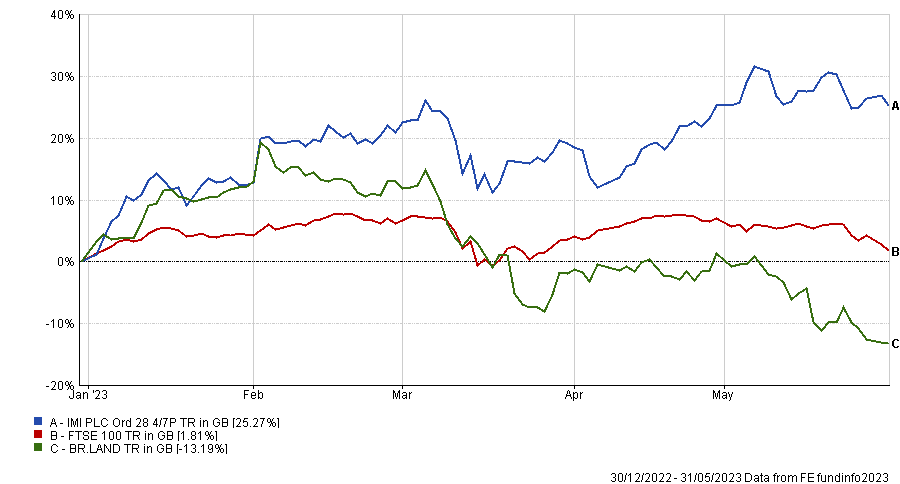Trading momentum can be a powerful force and with the rise of tracker funds, being added to or removed from an index can have a major impact on a company’s share price.
For example, being added to the FTSE 100 will mean many index funds have to buy the newly promoted company for the first time. The opposite is also true – with mass selling of those companies that are dropped. With the passive fund market hitting $10trn globally, index membership is more important than ever.
In the latest FTSE reshuffle by provider FTSE Russell Group, British Land Company was the only company to drop out of the premier index for UK large caps, with valve-maker IMI taking its place.
IMI is based in Birmingham and was formerly called Imperial Metals Industries. Its shares are up 25.3% so far this year as the oil price has recovered: the oil and gas industry makes up a large part of its target market.
Susannah Streeter, head of money and markets at Hargreaves Lansdown, said: “The engineering company has lifted its full-year earnings guidance following strong performance in the first quarter. It said the integration of recent acquisitions, including Heatmiser, purchased at the end of 2022, were progressing well and unlocking new opportunities for growth.”
It replaces British Land Co, which has dropped 13.2% so far in 2023, having lost 22.4% last year. The firm has been hit by rising interest rates and a softer property market. In its final results earlier this month, chief executive Simon Carter said market yields had been affected, with the value of the portfolio down 12.3% for the year.
Total return of companies vs FTSE 100 over YTD

Source: FE Analytics
Following its demotion, Streeter noted: “The value of its property portfolio had already been sideswiped by the rapid tightening in monetary policy and the shocker of an inflation reading last week dented the company’s valuation further.
Narrowly avoiding the drop from the FTSE 100 was Ocado, which left it late to remove itself from relegation contention.
The darling of the Covid bubble, online grocery store Ocado has come under pressure in recent years as customers have returned to physical supermarkets, but its tie-up with M&S could finally be bearing fruit, with shares rising on the back of strong results from its partner.
Streeter said: “Although their joint venture has been struggling, M&S has staged a slick recovery and still spies further potential with their partnership. It is planning to deepen its collaboration, with an Ocado Retail reset underway. This will include leveraging the potential of its vast treasure trove of M&S customers.
“This announcement gave Ocado’s share price a little bit more wind in its sails, helping it speed upwards, but volatility has returned today.”
In the FTSE 250, online fashion brand ASOS was dumped from the mid-cap index after disappointing results in which it posted a first-half loss of £87.4m.
“The retailer has badly stumbled amid the cost-of-living crisis, tripping off the pandemic highs it reached when e-commerce became the queen of shopping during Covid,” said Streeter.
Rivals such as Primark and Shein have taken market share, prompting the firm to shore up its balance sheet and make available hundreds of millions of pounds worth of new loans and credit facilities.
“It will really need inflation to subside before its core customers will return to splashing the cash. Even then it’ll have a fight on its hands, given how competitive it is in the fast-fashion space,” Streeter added.
Back in fashion is outsourcing firm Capita, which gained promotion from the FTSE Small Cap index into the FTSE 250 after its share price rose sharply in March.
Chief executive Jon Lewis has initiated a turnaround plan which includes controlling costs and reducing debt, with a programme of disposals underway.
“The company is cash generative after years of outflows and revenues grew 2.4% on an adjusted basis last year,” said Streeter.
“The data breach at the company following a cyber-attack, which is still being investigated, has knocked some confidence, but shares have still risen by almost a third since the start of the year, easing its passage back into the FTSE 250, which it was relegated from in March 2022.’’





